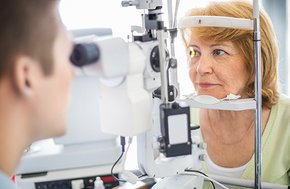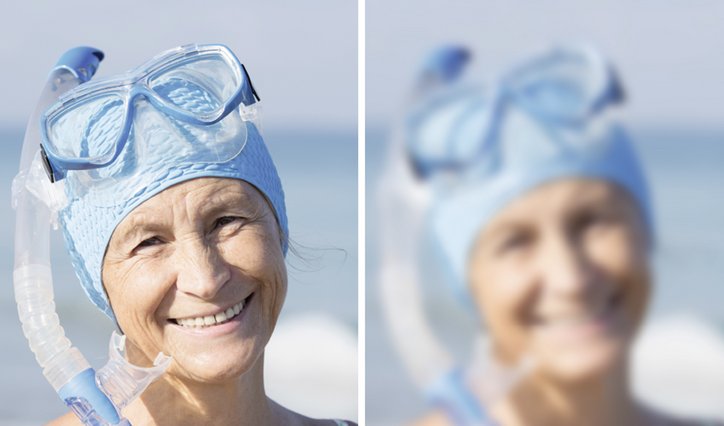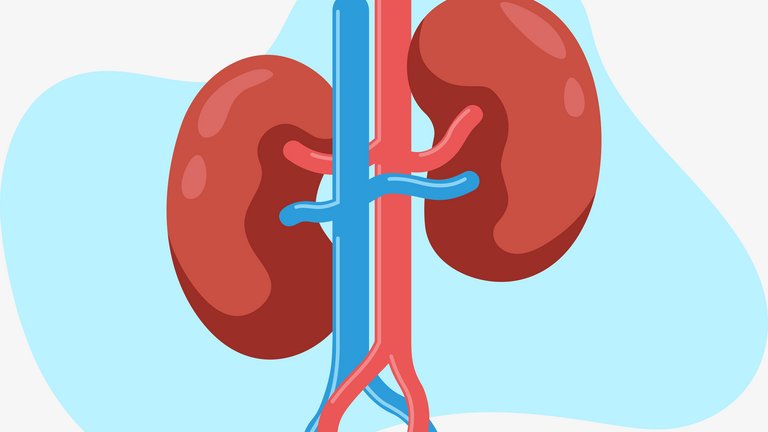Like nature, the body is a network where everything is connected. Consequently, when one organ fails, other organs can be affected too. There are, for instance, a number of studies that suggest a strong link between the eyes and the kidneys. They show that dialysis patients develop eye diseases more often than people at the same age who do not suffer from kidney disease. Hypertension, diabetes, smoking and obesity not only affect the kidney, but they are also risk factors for the most common eye diseases like age-related macular degeneration, diabetic retinopathy, glaucoma and cataracts. This also means that you can protect your eyesight by following the recommendations on how to handle these risk factors.
Kidney malfunctions and eyesight

The kidneys and the eyes have a lot in common on a physiological level. As a result of the strong link between these two organs, the causes for kidney and eye diseases are the same in many cases. That is why prevention, once again, makes a real difference. The following article gives pointers on how to do that.
Prevention is key

Patients often fail to notice the relevant symptoms in the beginning of the course of the disease. Therefore, regular eye exams are a vital component in preventing the progression of eye disease. An ocular examination can detect damage to the eyesight at an early stage, even before experiencing any symptoms. This ensures receiving treatment early enough to prevent irreversible visual impairment. If you are not sure about your next appointment for an ocular inspection, ask your physician about regular eye check-ups and follow the suggested therapy and controls. Also, remember that the eye drops prescribed by the ophthalmologist are essential for treating any loss of vision you may be suffering from or that may develop.
Although there may be a number of health complications related to renal disease, patients can do a lot to prevent severe problems by being aware of these risks and acting accordingly. Complying with your dialysis treatment means following your physician’s recommendations on liquid intake, prescribed medication, dietary guidelines, advised exercise, and non-smoking (if you were a smoker before).
Symptoms and syndromes
How do different eye diseases affect the eyesight? Here is a short overview of the most common disorders.
Age-related macular degeneration is the most wide-spread visual impairment. Due to the connection between kidneys and eyes, dialysis patients are more prone to this disease than healthy people from the same age group. A diminishing visual acuity or distorted vision are indicators that you should consult an eye specialist.
Diabetic retinopathy gradually damages the small vessels in the retina, leading to a visual impairment and in some cases even blindness. People with diabetic retinopathy start to see black spots or experience the darkening or distortion of images in the field of vision.
Usually, our horizontal angle of vision is approximately 180 degrees. Glaucoma affects the peripheral vision, meaning that this field of vision becomes smaller. A narrowed field of vision or patchy blind spots in the side or central vision can be symptoms of an advanced stage. However, many forms of glaucoma have no warning signs.
While the eye lens is typically clear, cataract causes the lens to become opaque. Patients often say that it feels like looking through a foggy or frosted over window.
Have an active part in prevention
Dialysis assumes the function of the kidneys, allowing the other organs, including the eyes, to keep working. While dialysis sessions take place three days a week, your organs work around the clock. They require your commitment to comply with your dialysis treatment to prevent the development of eye diseases. We, on our part, aim to give you the best possible treatment. Your cooperation and compliance are the best supporters to achieve this goal.
Here are a few tips for starting
- Make sure you have all the data you need to take your medication in the right dosage and at the right time. Do not hesitate to ask questions if you have any doubt.
- Follow an appropriate diet, consult your nephrologist or dietician for your plan. Your nurse can help you with any questions. You will also find tasty and suitable recipes in this magazine and on the NephroCare website.
- The World Health Organization recommends at least 150 minutes of moderate-intensity aerobic physical activity (for example brisk walking, jogging, gardening) and muscle strengthening activity per week, ideally 20 minutes per day. Feel like that is a bit much? Start slowly. Do some house chores, get up and walk a few steps every hour, go for small walks. Most importantly, avoid sitting or lying down for several hours. Increase your activity level step by step. Speak with your physician or nurse about tips. It is essential to consult your doctor on specific exercises that suit your condition.
- Any moment is a great moment to quit smoking. If you feel ready to stop, look for support and tips and tricks to help you. Ask your nurse or physician for advice. They can help you find information on various programmes for giving up smoking.
All this needs a fair degree of commitment, that is true. Think about other challenges you had overcome in your life. What helped you then? How can you apply those experiences to this situation? Discussing your thoughts with your nurses, your physician, your family and friends will help you along to strengthen your commitment. Take one step at a time. You will feel better day by day, your treatment results will be better, and you will benefit from knowing that you are contributing to protecting your eyesight.
References:
Bodaghi, B., Massamba, N., & Izzedine, H. (2014). The eye: A window on kidney diseases. Clinical Kidney Journal. https://doi.org/10.1093/ckj/sfu073.
Vrabec, R., Vatavuk, Z., Pavlović, D., Sesar, A., Cala, S., Mandić, K., & Bućan, K. (2005). Ocular findings in patients with chronic renal failure undergoing haemodialysis. Collegium Antropologicum.
Wong, C. W., Wong, T. Y., Cheng, C. Y., & Sabanayagam, C. (2014). Kidney and eye diseases: Common risk factors, etiological mechanisms, and pathways. Kidney International. https://doi.org/10.1038/ki.2013.491.




